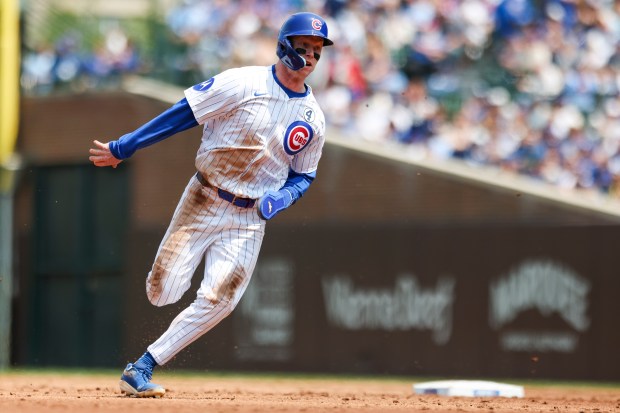Attorneys for R. Kelly will go before a federal appeals court Thursday in hopes of convincing justices to throw out the disgraced R&B star’s convictions for child pornography and inappropriate sexual conduct with minors.
Among Kelly’s claims: The charges were filed after the statute of limitations had expired, Kelly’s 20-year sentence was unduly harsh, and the child pornography charges should have been tried separately from the other counts he faced.
The brief arguments Thursday morning will mark the latest phase in Kelly’s long legal saga, which culminated in the convictions out of Chicago’s federal court and a separate guilty verdict in a federal racketeering case in Brooklyn. Arguments in the Brooklyn appeal are scheduled for next month.
Kelly was sentenced to 30 years for racketeering and 20 more in the Chicago case, most of which will be served concurrently. The 57-year-old singer is in custody at a federal prison in North Carolina, records show. If his convictions hold, he would be in his 80s before he is eligible for release.
Arguments at the 7th Circuit U.S. Court of Appeals are expected to be short, with Kelly’s attorneys and prosecutors each getting 15 minutes to make their claims.
A federal jury in Chicago convicted Kelly in 2022 on child pornography charges for explicit videos he made of himself and his then 14-year-old goddaughter, “Jane.” Kelly was also found guilty of inappropriate sexual relations with Jane and two other teenage girls, “Pauline” and “Nia.”
The jury acquitted Kelly and two co-defendants on separate charges of conspiring to rig his prior Cook County child pornography trial.
Kelly abused the three girls in the 1990s, when the law allowed prosecutors to bring such charges until the victims turned 25. Congress in 2003 expanded the statute of limitations up until the victim’s death, but Kelly’s attorney Jennifer Bonjean argued in her appellate brief that lawmakers never intended that amendment to apply retroactively. Prosecutors could not have brought these charges any later than 2009, Bonjean said.
In their response filing, prosecutors note that Congress expanded the statute of limitations long before it otherwise would have expired for Jane, Nia and Pauline. That’s a deadline extension, not a retroactive application of the law, they argued.
Kelly’s briefings also argue that the charges against Kelly should have been split into separate groups: The child pornography counts, which had “dramatically stronger evidence” in the form of the videos of Kelly sexually abusing Jane, and the enticement counts involving Nia and Pauline.
The videos were such strong evidence of Kelly’s guilt that jurors likely didn’t completely consider whether prosecutors met their burden of proof on the separate accusations involving the two other girls, Kelly’s defense team argued.
Kelly also would have testified in his own defense on the charges involving Nia and Pauline, but didn’t do so, in order to avoid giving self-incriminating testimony about the other counts, according to Bonjean.
But prosecutors said jurors were explicitly instructed to consider each charge separately and they clearly did so, noting that while Kelly was convicted of abusing three teenage girls, he was acquitted of abusing two others.
Finally, Bonjean asked the appellate court to grant him a new sentencing hearing, arguing there was no justification for a prison term above federal guidelines. U.S. District Judge Harry Leinenweber gave Kelly a 20-year sentence, all but one year of which will be served concurrently with his 30-year sentence out of Brooklyn.
That kind of sentence is not unreasonable, prosecutors argued in their briefing, given the “horrendous offense conduct for which defendant was convicted.”
Kelly, a Chicago native and onetime R&B superstar, had a stunning fall from grace after allegations of sexual abuse and misconduct reached a tipping point in 2019. Cook County prosecutors announced charges against Kelly early that year; a few months later, those were followed by the dual indictments in federal court.
Kelly’s 2022 trial in Chicago’s federal court featured 34 witnesses over five weeks. Jurors were shown clips from three separate videos made in the 1990s depicting Kelly abusing Jane, including the same tape from his Cook County trial as well as another where he instructed her to refer repeatedly to her “14-year-old” genitalia.
Jane testified for the first time at trial that not only was it her on the videotapes, but that Kelly had sexually abused her “innumerable” times when she was a minor, at his recording studio, his home, on tour buses and in hotel rooms.
Asked on the witness stand why, after two decades of silence, she finally decided to come forward and speak out, Jane said: “I became exhausted with living with (Kelly’s) lies.”
The jury’s split verdict came 14 years after Kelly’s infamous acquittal on similar charges in Cook County, which were based on a single video of Kelly allegedly abusing Jane in his former home. Jane had refused to cooperate in that case.
In a rare loss for federal prosecutors, the jury acquitted Kelly and two co-defendants on charges they conspired to retrieve incriminating tapes and rig his 2008 trial by pressuring Jane to lie to investigators about their relationship and refuse to testify against him.
Kelly was also found not guilty of filming himself with Jane on a video that jurors never saw. Prosecutors said “Video 4” was not played because Kelly’s team successfully buried it, but defense attorneys questioned whether it existed at all.
After Kelly’s federal convictions, Cook County prosecutors dropped their charges against him, in part to conserve resources given that he would already be serving significant prison time.
mcrepeau@chicagotribune.com
jmeisner@chicagotribune.com



